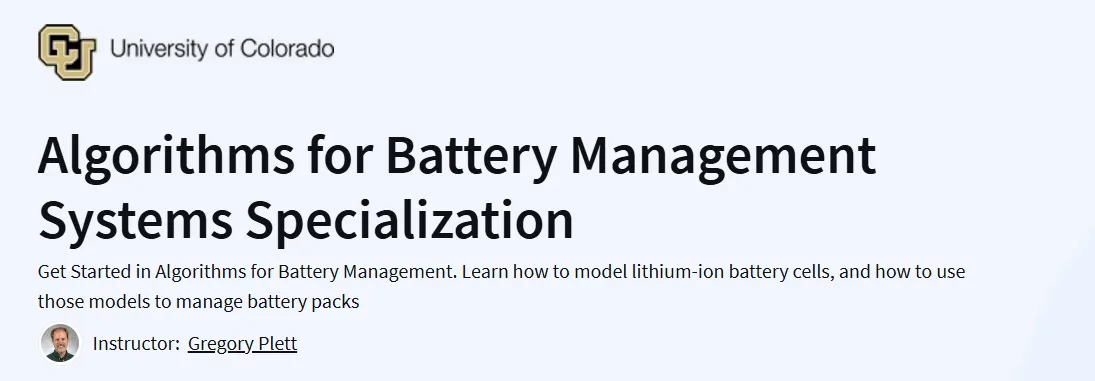What you will learn in Algorithms for Battery Management Systems Specialization Course
- Battery Management System (BMS) Fundamentals: Understand the major functions provided by a BMS, including state-of-charge (SOC) and state-of-health (SOH) estimation, balancing, and power estimation.
- Mathematical Modeling of Lithium-Ion Batteries: Learn to design equivalent-circuit models for lithium-ion battery cells and simulate their behaviors under different load profiles.
- Algorithm Development: Develop algorithms to estimate SOC, SOH, remaining energy, and available power, and to design cell balancing systems for battery packs.
Program Overview
Introduction to Battery-Management Systems
⏳ 24 hours
Learn the terminology and functions of lithium-ion battery cells.
Understand the requirements of a BMS and the components involved.
Explore current, temperature, and isolation measurement techniques.
Study protection mechanisms and failure modes.
Compute stored energy in a battery pack.
Equivalent Circuit Cell Model Simulation
⏳ 27 hours
Design equivalent-circuit models for lithium-ion battery cells.
Determine parameter values from lab-test data.
Simulate cell behaviors under different load profiles.
Use Octave/MATLAB for simulations.
Battery State-of-Charge (SOC) Estimation
⏳ 27 hours
Implement SOC estimators for lithium-ion battery cells.
Apply algorithms and mathematical analysis.
Utilize regression and statistical methods.
Use Octave/MATLAB for implementation.
Battery State-of-Health (SOH) Estimation
⏳ 22 hours
Implement SOH estimators for lithium-ion battery cells.
Evaluate different estimation methods.
Analyze capacity and resistance degradation.
Use Octave/MATLAB for implementation.
Battery Pack Balancing and Power Estimation
⏳ 22 hours
Design balancing systems for battery packs.
Compute remaining energy and available power.
Implement passive balancing methods.
Use Octave/MATLAB for simulations.
Get certificate
Job Outlook
- Proficiency in battery management systems is valuable for roles such as Battery Systems Engineer, Electrical Engineer, and Energy Storage Specialist.
- Skills acquired in this specialization are applicable across various industries, including electric vehicles, renewable energy, and consumer electronics.
- Completing this specialization can enhance your qualifications for positions that require expertise in battery technology and management systems.
Explore More Learning Paths
Enhance your understanding of algorithms and their applications in battery management and beyond with these related courses and resources. These learning paths are perfect for strengthening your technical expertise and problem-solving skills.
Related Courses
Algorithms Specialization
Build a strong foundation in fundamental algorithms and data structures, essential for tackling complex computational problems.Advanced Learning Algorithms
Explore advanced algorithmic techniques and learn how to apply them efficiently to real-world scenarios.Algorithms on Strings
Focus on string-related algorithms, key for text processing, coding challenges, and computational problem-solving.
Related Reading
What Is Python Used For
Discover how Python leverages algorithms in practical applications, from battery management systems to broader data science and engineering projects.
Specification: Algorithms for Battery Management Systems Specialization Course
|
FAQs
- The course assumes basic understanding of electrical circuits and battery fundamentals.
- Beginners can benefit with supplemental reading on battery chemistry and circuit basics.
- Familiarity with embedded systems or programming is helpful but not mandatory.
- Exercises and examples are structured to guide learners step-by-step.
- MATLAB and Simulink are commonly used for modeling and simulations.
- Basic knowledge of Python or C programming can help but is not strictly required.
- Starter scripts and templates are often provided to simplify implementation.
- Hands-on practice with simulations enhances understanding of algorithm behavior.
- Teaches core algorithms for battery monitoring, state-of-charge estimation, and protection.
- Knowledge can be applied to electric vehicles, renewable energy storage, or industrial batteries.
- Real-world implementation may require additional hardware and testing experience.
- Simulations provided in the course prepare learners for practical experimentation.
- Covers linear algebra, differential equations, and control theory at an applied level.
- Focus is on using formulas for modeling and algorithms rather than theoretical proofs.
- Prior exposure to basic calculus and matrix operations is helpful.
- Exercises emphasize practical computation and simulation of battery models.
- Demonstrates expertise in battery monitoring and management strategies.
- Enhances employability in electric vehicle, renewable energy, and battery technology roles.
- Portfolio projects and simulations can be showcased to employers.
- Hands-on experience with real hardware can further strengthen career prospects.





